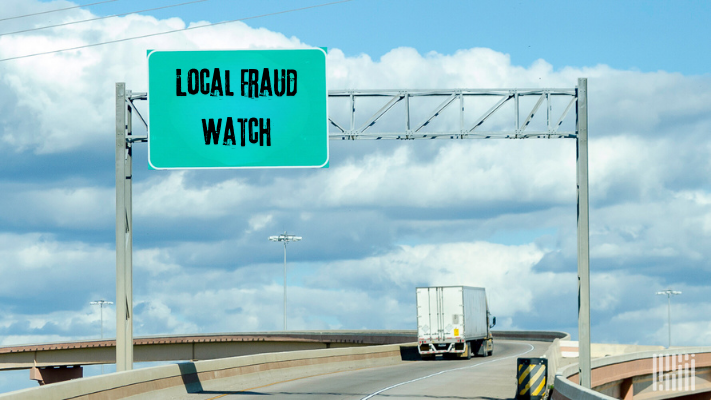Welcome to the inaugural edition of Fraud Watch, FreightWaves’ dedicated newsletter tackling the burgeoning crisis of freight fraud.
What was once a sporadic issue has evolved into a multibillion-dollar challenge, drawing comparisons to fraud in the credit card industry and highlighting how that sector forged a unified front to combat it.
By exploiting gaps in transparency, jurisdictional limitations and the rapid rise of FreightTech, freight fraud has surged and become the “perfect crime.”
Tactics such as double-brokering schemes and identity theft have become widespread, with fraudsters easily manipulating load boards and hijacking carrier information through phishing and fake emails.
Industry leaders are calling for collective action, such as uniform standards and shared databases, to track and deter fraud globally. The future of combating freight fraud relies on collaboration and transparency.
Future editions of Fraud Watch will dive into specific fraud types, countermeasures and regulatory changes essential for protecting supply chains.
Join us as we uncover the latest insights and work to restore trust in logistics!

Freight Fraud Files – Case No. 001
Victim: Will Jenkins, founder of Journey (previously co-founded MoLo Logistics, acquired by ArcBest)
What Happened: Shortly after launching MoLo Logistics in August 2017, Jenkins recounts, the company experienced a significant fraud incident. Freshly arriving on the scene, MoLo did not yet have robust compliance and verification processes in place. This lack of checks and balances would soon come back to haunt the company.
Jenkins explained that MoLo booked a load to be transported from Las Cruces, New Mexico, to Virginia. Without the right procedures in place, MoLo ended up cutting a fuel advance check to the carrier. After receiving the advance payment, the carrier disappeared and stopped answering calls.
Suddenly, MoLo was out around $2,500. As a new brokerage, this financial hit was significant. The company scrambled to figure out what had happened and who actually had the load.
Eventually, through some investigative work, MoLo was able to track down the real carrier.
To the company’s surprise, this carrier provided a rate confirmation that was much lower than what the fraudulent carrier had claimed. MoLo then had to navigate complex negotiations to ensure the load was delivered and the real carrier was paid appropriately. MoLo also worked to recoup some of its losses from the fuel advance.
Advice: Jenkins explained that this experience served as a wake-up call for MoLo’s team members. They realized they needed to implement much stricter policies and verification procedures to prevent such incidents from happening again. Jenkins outlined new fuel advance requirements that were put in place, including:
- Limiting advances to less than 50% of the total load amount.
- Requiring verbal confirmation from the carrier’s owner before issuing an advance.
- Verifying carrier information and getting email confirmation from the FMCSA-registered carrier email.
These robust measures significantly reduced MoLo’s vulnerability. Jenkins emphasizes that after implementing these new policies, the company did not experience any further fraud incidents of this nature.

Local Fraud Watch
Potomac Metals (PMI), a scrap metal recycling company based in Sterling, Virginia, suffered a significant loss due to cargo theft earlier this year.
A load worth $200,000 was stolen from one of PMI’s recycling locations. The team had loaded material onto a truck heading to Pennsylvania but later got a call from dispatch saying the truck had broken down and needed a part. While the truck was supposedly broken down, it was actually being transported to California, and the materials were stolen.
In mid-October, a full shipment of copper worth $175,000 was stolen from Potomac Metals. However, thanks to real-time tracking technology from Tive, the company was able to monitor the stolen shipment as it traveled 400 miles past its intended destination. This enabled company officials to quickly alert authorities and recover the entire shipment within hours.
Learn more about PMI’s new fraud protocol here.

From the Fraud Desk
- Election 2024: US lawmakers who support initiatives to fight freight fraud
- Virginia engineer sentenced in $15.6M investor fraud scheme
- AI will have huge impact on freight but also overhyped, says Transflo exec
- Inaugural Freight Fraud Awareness Day shines light on industry crisis
Join our newsletter here.











